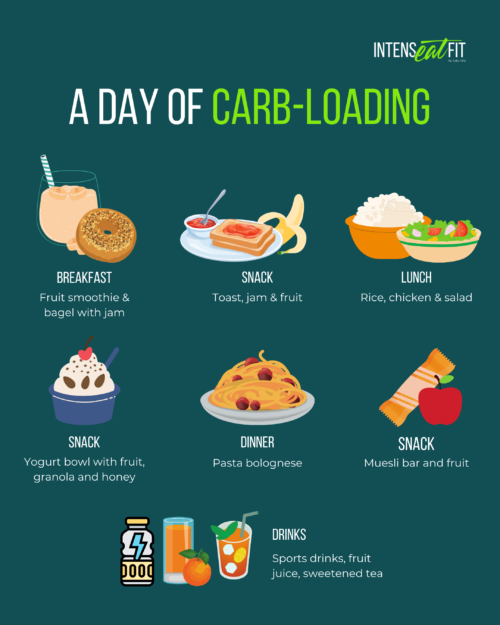Your complete guide to a successful pre-race carbohydrate loading
As an endurance athlete, carbohydrates are your primary fuel. Just as you want to top up your fuel tank before a long trip, you also want to top up your carbohydrate reserves before an important event. You need to increase your fuel reserves by following a successful carbohydrate loading protocol as part of your pre-race fuelling.
Is carb loading necessary for endurance athletes?
Following a carb loading protocol for at least 24 hours before an endurance event with a duration of at least 90 minutes is necessary to maximise the glycogen reserves in your body. Besides, carbohydrate loading for endurance athletes increases time to exhaustion by about 20% on average and improves time trial results by about 2 to 3%.
How to carb load correctly
You need to consider three key elements for a successful carbohydrate loading: Type of food, quantity and duration.
Type of food
You guessed it, carbohydrates are the focus of a carb-loading protocol. Choosing the correct type of carbohydrates is essential. You need to select food options high in carbohydrates but low in fat and fibre. Relying on donuts or creamy pasta as your main foods during this loading period is unlikely to be helpful.
It is also essential to choose foods you are familiar with. Now it’s not the time to experiment with new dishes or cuisines.
Quantity
You need to consume 8-10 grams of carbohydrate per kilogram of body weight per day. This means that a 65kg athlete will need to consume 520 - 650 grams of carbohydrate per day—the equivalent of more than 10 cups of cooked rice, to give you an idea.
Duration
The carbohydrate loading needs to occur at least 24 hours before events of a maximum of 90 minutes and up to 48 hours before those longer than 90 minutes. A big pasta dinner the night before your race is helpful but insufficient for topping your tank reserves.
Example of a carbohydrate loading meal plan
Below are some examples of foods to include as part of your carb loading.

Hot tips for a successful carb loading for endurance athletes
- Choose compact sources of energy to make it easier to increase your intake. Options like rice, pasta, bread and potatoes are excellent as the base of your main meals.
- Include carbohydrate-rich foods such as jam, honey, fruit juice, energy bars, or sports drinks to increase your carb intake without adding too much volume.
- Include small regular snacks to spread the intake across the day and keep your gut comfortable.
- Stay well hydrated since glycogen needs water to be stored in your muscles.
- Plan what you will eat. The days before a race are often hectic. Therefore, consider the logistics and schedule for the days before the event when putting your carb-loading plan together.
- Try the carb loading plan before race day. Don’t wait to test the food on race week. Instead, choose a big training session to test the carb loading and confirm you are happy with your plan.
The final remarks
When done right, carbohydrate loading is an effective strategy to increase fuel reserves and support a successful result on race day for endurance athletes.
Sources






